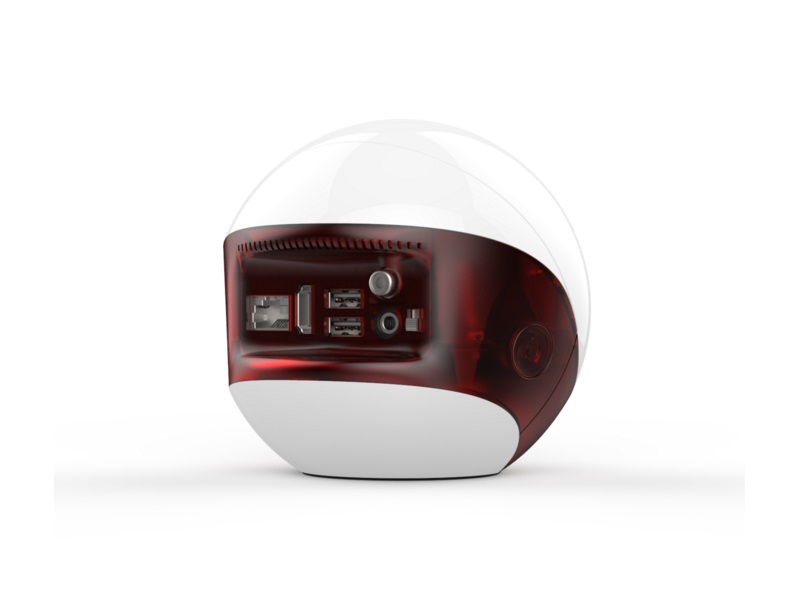- Home
- Laptops
- Laptops News
- New PC Makes the 'Internet' Available Offline
New PC Makes the 'Internet' Available Offline

The company unveiled a grapefruit-sized spherical desktop this week at the International Consumer Electronics Show in Las Vegas. Called the Endless Mini, the device's true innovation may be the way it holds key websites on its hard drive even when there is no Internet connection - as well as its rock-bottom price of $79, which might finally get modern technology into the hands of the world's poorest citizens.
"I find it tragic that there are billions of people who don't have computers," said Endless chief executive Matt Dalio. "The most important thing we can do in making that happen is to lower the price barrier. The second most important thing we can do is solve Internet connectivity."
Dalio says his team conducted extensive research of developing markets and found that consumers want more affordable computers, not just smartphones. The Endless Mini comes preloaded with 650 megabytes of content, such as Wikipedia articles or educational materials from the Khan Academy, that could be searched and used without a connection. The idea is to give people the benefits of the Internet without having to pay the expense of a robust data plan.
If the computer ever is connected to the Web, it will download the latest versions of the articles that have updated.
Dalio says the aim isn't to turn a profit on the $79 device. But he expects to sell accessories for the computer, which is how they'll eventually make their money. Notably, the computer does not come with a mouse or keyboard.
The Endless Mini doesn't come with a monitor either. Users will have to provide their own, and they could potentially use their TV as a display. Dalio says that while surveying demand in the developing world, he found that consumers have a range of desires for screens, so it didn't want to force one solution on them.
Dalio is targeting Guatemala as its first market and plans to grow to Mexico and China. He estimates that the global market for a $79 (roughly Rs. 5,200) computer is about 2 billion. Endless has arranged financing that allows Guatemalans to pay off the device for $3 (roughly Rs. 200) a month.
This is not the first attempt to bring affordable computers to the developing world. One Laptop per Child, an effort to bring $100 (roughly Rs. 6,600) laptops to developing countries, received much attention when it launched in 2005. Ultimately, it wasn't a resounding success. The laptops proved more expensive than believed, and fewer units shipped than expected.
Dalio doesn't expect to have a similar fate, arguing that the big drops in the prices of components for the computer have helped Endless deliver a more powerful and useful product.
The base model comes with 24 gigabytes of storage, is powered by an ARM Cortex-A processor and includes over 100 applications, including options for word processing, making spreadsheets and playing games. The operated system is based on Linux.
© 2016 The Washington Post
For the latest tech news and reviews, follow Gadgets 360 on X, Facebook, WhatsApp, Threads and Google News. For the latest videos on gadgets and tech, subscribe to our YouTube channel. If you want to know everything about top influencers, follow our in-house Who'sThat360 on Instagram and YouTube.
Related Stories
- Samsung Galaxy Unpacked 2025
- ChatGPT
- Redmi Note 14 Pro+
- iPhone 16
- Apple Vision Pro
- Oneplus 12
- OnePlus Nord CE 3 Lite 5G
- iPhone 13
- Xiaomi 14 Pro
- Oppo Find N3
- Tecno Spark Go (2023)
- Realme V30
- Best Phones Under 25000
- Samsung Galaxy S24 Series
- Cryptocurrency
- iQoo 12
- Samsung Galaxy S24 Ultra
- Giottus
- Samsung Galaxy Z Flip 5
- Apple 'Scary Fast'
- Housefull 5
- GoPro Hero 12 Black Review
- Invincible Season 2
- JioGlass
- HD Ready TV
- Laptop Under 50000
- Smartwatch Under 10000
- Latest Mobile Phones
- Compare Phones
- Redmi Turbo 4
- Vivo Y200+
- Lava Yuva 2 5G
- OnePlus Ace 5
- OnePlus Ace 5 Pro
- Oppo A5 Pro 5G
- Vivo Y29 5G
- Honor Magic 7 RSR Porsche Design
- Asus Zenbook S 14
- MacBook Pro 16-inch (M4 Max, 2024)
- Honor Pad X9 Pro
- Honor Pad V9
- boAt Enigma Gem
- boAt Enigma Daze
- Sony 65 Inches Ultra HD (4K) LED Smart TV (KD-65X74L)
- TCL 55 Inches Ultra HD (4K) LED Smart TV (55C61B)
- Sony PlayStation 5 Pro
- Sony PlayStation 5 Slim Digital Edition
- Blue Star 1.5 Ton 3 Star Inverter Split AC (IC318DNUHC)
- Blue Star 1.5 Ton 3 Star Inverter Split AC (IA318VKU)

















